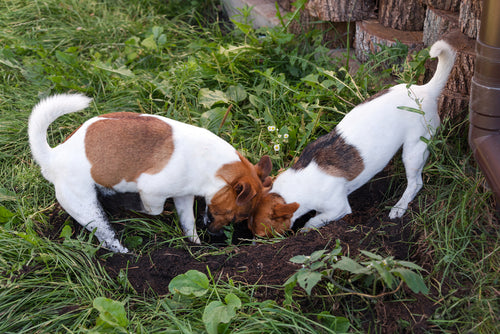Have you been wondering why your dog has decided to add their own personal touch (the hollow kind) in your backyard? Their personal excavation mission may be a mystery and leaving you asking, “why and what is the purpose?” While this behaviour may be enjoyable for our furry friends, it can lead to serious consequences for their owners. Not only is digging very destructive to your property, but it can also give our beloved pups a possible escape route.
So why do dogs start digging holes? And what can you do to stop it?
When realising that digging is simply a part of many dogs, you can understand why this behaviour may require extra attention to stop. Just because it is an instinctual behaviour does not mean that we want it occurring in our yards, and there are a few successful ways to put an end to the behaviour for good. A digging dog can cause stress for pet owners.
Whether they are digging out of boredom, or plotting an escape route, the action of digging is in your canines DNA. While this impulse may be present in all dogs in some form, the need to dig is stronger in some breeds than others. Some dog breeds have been bred specifically for their hunting and digging abilities, as they were experts in chasing small animals and critters into their burrows. Humans played a huge role in creating dogs that are so drawn to digging holes. By breeding the pups that were excellent diggers, we were left with digging professionals. Because of this, the urge to dig remains present in many of the dog breeds within our homes. Dachshunds, Jack Russell Terriers, Huskies, Beagles and more.
Not only can a passing animal cause a dog to dig in hopes of finding them, but their scent can cause a dog to dig as well. Animal droppings and leftover scents can trigger a dog’s urge to hunt, leading to excessive digging in certain areas.
Stress & Boredom: Dogs can also result to digging holes to relieve stress, anxiety, or boredom. A bored dog with built up energy might result to digging as a fun way to use up their energy. Dogs need mental and physical stimulation and may experience stress when their needs are not met. It is crucial that they are getting an adequate amount of exercise for their breed type. If your hyper pup is digging every chance he gets, it may be time to step up their mental and physical stimulation.
Burying Treasure: Some dogs like to bury treasures, such as a treat or a favourite toy for safekeeping. Unfortunately, they don't always remember to make a treasure map, which leads to more digging as they search for their hidden cache. Many dogs will hold their favourite item in their mouth as they search their yard for the perfect place to dig. You may then see them drop the item in the new hole, often nuzzling the dirt with their nose while they bury it.
Escaping: Some dogs have an undying need to run free. If an escape artist can’t find a way to jump over or through an obstacle, they may turn to the next option, going under! If a dog can dig a deep enough hole, it may be successful in escaping from the yard. Fences don’t often go deep underground, giving them the perfect escape tunnel if they are dedicated enough to escaping. If your dog is always digging at the base of your fence, they may be trying to plot an escape. This escape plan can be dangerous for dogs, as they can fall victim to many unfortunate fates when roaming the world on their own. Especially if they are not road smart.
Risks for digging dogs:
- Escaping from your yard and roaming the streets
- Broken nails
- Damage around your yard
- Increased risk of tripping in previously dug holes
- Exposure to bacteria and parasites that live within the soil
Because digging is so deeply ingrained in dogs, it's unlikely that you'll be able to put a complete stop to it. But you can minimise the behaviour and reduce the damage to your yard by following a few tips.
- Place obstacles and deterrents where your dog likes to dig. This might include burying chicken wire along fences, placing rocks or stones in garden beds, or you could try some natural dog poo (their own) in the holes, this is usually a big deterrent!
- If your male dog is an escape artist, having him desexed will reduce his desire to roam.
- Designate a spot where it's okay for your pooch to dig. A sandpit can work great if your dog likes to dig for fun!
- Provide an outdoor bed in a shady spot for dogs who like to dig to cool themselves off. Redirect them to this spot when you catch them digging.
- If you have a dog with a strong prey drive, controlling the rodent population in your yard will help reduce their temptation to dig for prey. Avoid using poisons, which could end up getting transferred to your pup and can be deadly.
- Don't allow your pup to take treats or toys outside if they like to bury them.
- Provide plenty of mental and physical stimulation to help reduce the drive to dig. High-energy dogs like terriers need at least 30 minutes to an hour a day of activity and exercise, which can include walking and playing games like fetch
- While it's not possible to watch your dog every moment, try not to leave them in your yard unsupervised more than necessary. If your dog is digging to relieve separation anxiety, consider acclimating them to stay in a crate while you're gone, along with interactive toys to keep them occupied.
Your local Just For Pets independent pet store has a large array of toys to help keep your pooch mentally stimulated like KONG, LickiMat and snuffle mats, chat to them today.
Article kindly supplied by Hill’s Pet Nutrition


.jpg?v=1664943294593&options=w_600)



